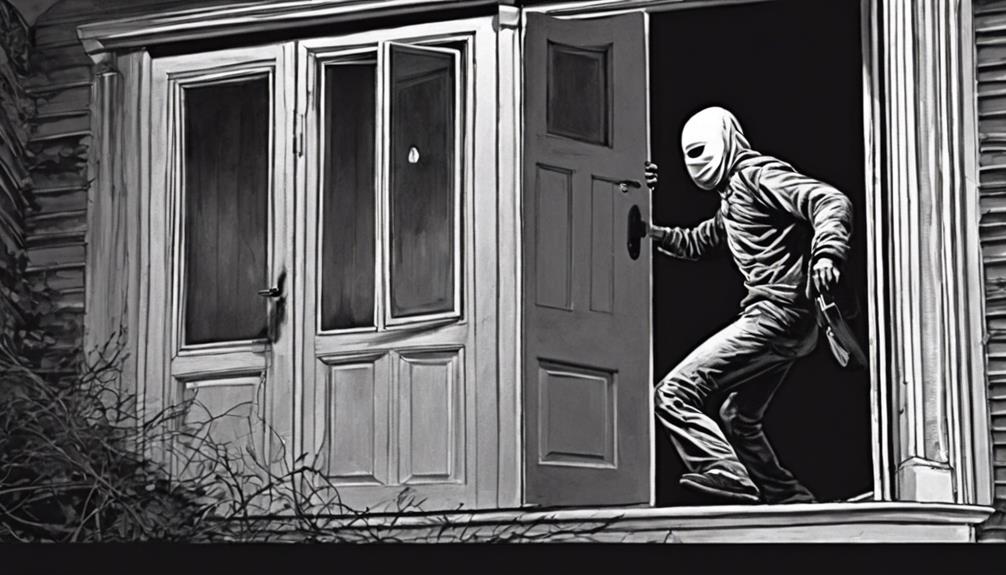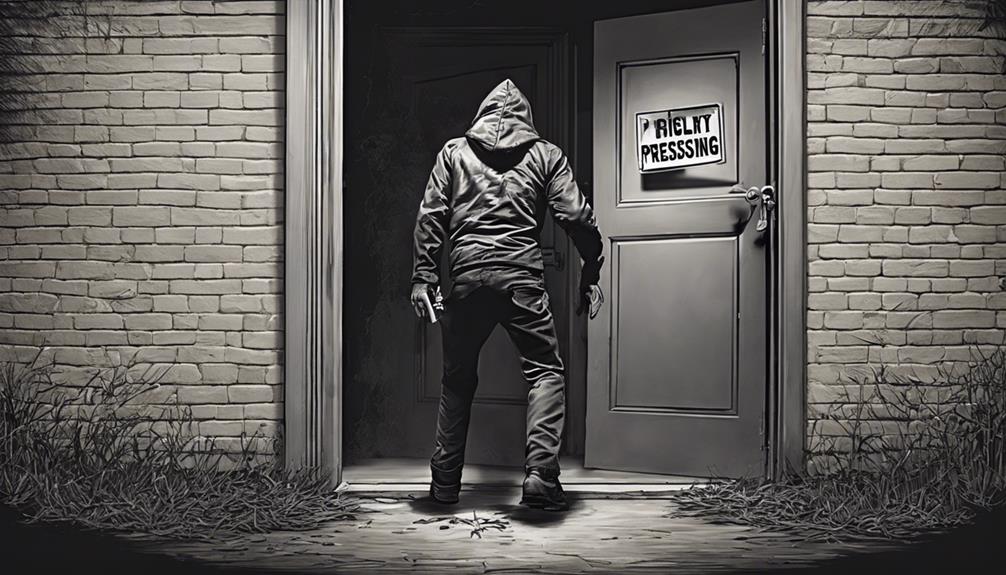Burglary is when a person unlawfully enters a building with the intent to commit a crime. Trespassing, on the other hand, is being on someone’s property without permission or criminal intent. Burglary typically results in felony charges, while trespassing is usually considered a misdemeanor. Burglary requires proof of criminal intent, which sets it apart from trespassing. It is essential to understand these distinctions in legal matters. Further exploration can offer valuable insights into the differences and legal consequences of the two offenses.
Key Takeaways
- Burglary involves unlawful entry with intent to commit a crime.
- Trespassing is entering without consent or criminal intent.
- Burglary is a felony requiring proof of criminal intent.
- Trespassing is typically a misdemeanor offense.
- Intent to commit a crime distinguishes burglary from trespassing.
Legal Definitions of Burglary and Trespassing
The legal definitions of burglary and trespassing clarify the distinctions between these two criminal offenses. Burglary involves unlawfully entering a building with the intent to commit a crime, such as theft or assault. On the other hand, trespassing is defined as entering or remaining on someone's property without consent, without the intent to commit a crime. The key disparity lies in the intention behind the entry: burglary entails a criminal purpose, while trespassing doesn't involve such intent.
In terms of legal consequences, burglary carries more severe penalties, often resulting in felony charges. Prosecutors must demonstrate the intent to commit a crime inside a dwelling for a burglary charge. Conversely, trespassing is typically considered a misdemeanor offense and doesn't necessitate proof of intent. The repercussions of a burglary conviction can lead to significant prison time, while trespassing convictions usually don't result in imprisonment. Understanding these distinctions is essential in comprehending the gravity of each offense under the law.
Elements of Burglary Offense

Moving from the legal definitions of burglary and trespassing, the elements of a burglary offense primarily center around unauthorized entry into a building with the intent to commit a crime inside. The key aspect of burglary is the intent to commit a crime once inside the premises. This crime could range from theft to assault.
Importantly, the entry doesn't necessarily have to involve force; simply using a body part to gain access constitutes burglary. Prosecutors often rely on circumstantial evidence to establish the accused's intent to commit a crime.
Understanding these elements is vital in differentiating burglary from other offenses like trespassing, which we'll explore in the subsequent section.
Elements of Trespassing Offense

Intentionally entering another person's land without lawful purpose or consent constitutes trespassing under Tennessee laws. Trespassing can result in a Class C misdemeanor charge in Tennessee, carrying penalties of fines up to $500 and/or up to 30 days in jail. Penalties may escalate if the entry involves property damage or forceful entry beyond simple unauthorized access. Defenses against trespassing allegations include proving consent from the property owner, mistaken entry thinking it was public property, or entry due to public necessity. Ownership disputes over property rights can also serve as a defense against trespassing allegations in Tennessee.
| Elements of Trespassing Offense | |
|---|---|
| Intention | Entering without consent |
| Knowledge | Awareness of unauthorized entry |
| State of Mind | Deliberate action without permission |
| Penalties | Class C misdemeanor, fines up to $500, and/or up to 30 days in jail |
Penalties for Burglary Convictions

Facing burglary convictions in Pennsylvania can lead to severe penalties and long-term consequences, including significant fines, imprisonment for up to 15 years, and restitution for damages. The seriousness of these penalties escalates if aggravating factors like weapon use or prior criminal history are involved.
Possession of burglary tools is considered a first-degree misdemeanor in Pennsylvania, carrying its own set of penalties. Prosecutors must prove all elements of burglary beyond a reasonable doubt to secure a conviction and impose appropriate penalties.
Felony charges can result from burglary convictions, leading to significant fines, lengthy imprisonment, and the responsibility to compensate for damages caused. It's essential for individuals facing burglary accusations to understand the potential consequences and seek legal counsel to navigate the complexities of the legal system.
Understanding the gravity of burglary convictions and their associated penalties is vital for individuals to make informed decisions and defend their rights effectively.
Penalties for Trespassing Offenses

Penalties for trespassing offenses in Tennessee are typically classified as Class C misdemeanors, with fines up to $500 and potential imprisonment for up to 30 days. In cases where the trespass involves property damage or forceful entry, the penalties may escalate.
However, if the individual had consent from the property owner or occupant, this can serve as a significant defense against trespassing allegations. Public necessity could justify entry in emergencies to prevent harm and can be used as a defense in trespassing cases.
Understanding these penalties and potential defenses is vital for individuals who may find themselves facing trespassing charges in Tennessee. By being aware of the consequences and legal options available, individuals can navigate the legal system more effectively if they ever encounter a trespassing accusation.
Key Differences Between Burglary and Trespassing

When differentiating between burglary and trespassing, it becomes important to understand the distinct elements that define each offense. Here are the key differences:
- Intent: Burglary involves unlawful entry with the purpose to commit a crime, while trespassing is entering without any intention to commit a crime.
- Penalties: Burglary carries harsher consequences, often leading to felony charges and potential prison time, whereas trespassing is typically considered a misdemeanor offense with less severe penalties.
- Intent Requirement: A vital element for burglary is the intent to commit a crime inside a dwelling, while trespassing doesn't require proof of intent to commit a crime.
- Evidence and Charges: Prosecutors often rely on indirect evidence to establish intent in burglary cases, whereas trespassing charges are based on the level of force used to enter the property.
Understanding these distinctions is important in dealing with the legal implications of burglary and trespassing offenses.
Defenses Against Burglary Charges

When facing burglary charges, individuals can use an alibi to prove their absence during the crime, lack of intent to commit an offense upon entry, or mistaken identity if they weren't the actual burglar. These defenses can help negate allegations and protect one's innocence in a court of law.
Providing evidence of lawful entry or consent from the property owner can also serve as strong defenses against burglary accusations.
Alibi as Defense
An effective defense strategy against burglary charges is presenting a solid alibi that proves the accused's absence during the crime. When utilizing an alibi defense, the accused aims to demonstrate their whereabouts at the time of the burglary, casting doubt on their involvement.
Alibis often rely on witness testimony, surveillance footage, or other evidence to establish the accused's location elsewhere. By providing a strong alibi supported by detailed documentation and corroboration, the accused can create reasonable doubt about their participation in the burglary.
This defense strategy requires thorough preparation and presentation to effectively challenge the prosecution's case.
Lack of Intent
Demonstrating a lack of intent to commit a crime upon entering a building forms an important defense strategy against burglary charges. If the individual can show they entered the premises without the intention to commit a crime inside, it can undermine the prosecution's case for burglary.
Providing evidence of lawful entry, such as having a legitimate reason to be on the property, can also help negate accusations of burglary. This defense highlights the significance of proving that the defendant didn't have criminal intentions when entering the building.
Mistaken Identity
Entering the domain of mistaken identity defense in burglary cases requires a clear establishment that the accused wasn't the individual responsible for the alleged crime. When facing such accusations, there are several strategies that can be employed to defend against burglary charges:
- Establishing an alibi demonstrating the absence during the burglary.
- Proving legal entry with the right to be on the property, which can negate burglary allegations.
- Showing consent from the property owner to enter the premises can serve as a strong defense.
- Disputing ownership rights over the property can also be used as a defense in burglary cases.
Defenses Against Trespassing Allegations

Legal defenses against trespassing allegations include:
- Proving property ownership through documentation.
- Providing evidence of legal access to the property.
- Displaying prominent 'No Trespassing' signage as a deterrent.
These defenses can help individuals refute trespassing accusations and demonstrate lawful intent in their actions on the property. By preparing these defenses, individuals can protect themselves from legal consequences related to unauthorized entry onto private property.
Property Ownership Proof
Ownership proof, such as a deed or title, can serve as a solid defense against allegations of trespassing. When faced with trespassing accusations, demonstrating ownership or lawful occupancy through documentation can be vital. Here are key ways in which property ownership proof can be used as a defense:
- Providing evidence of being the rightful owner or lawful occupant of the property.
- Using ownership documents like property tax records or lease agreements to support the claim of lawful presence.
- Demonstrating legal authority to be on the premises through documentation.
- Verifying ownership via official records to establish a valid defense against trespassing allegations.
Legal Access Documentation
When facing accusations of trespassing, establishing legal access through proper documentation is essential in mounting a strong defense. Consent from the property owner, mistaken entry, public necessity, and property ownership disputes can serve as valid defenses. Documentation proving lawful access, such as a lease agreement or rental contract, is vital in defending against trespassing allegations.
By presenting these documents, individuals can demonstrate their right to be on the property, potentially resolving misunderstandings or disputes. It's important to keep such documentation readily available and up to date to swiftly address any trespassing accusations.
In legal matters concerning trespassing, having the proper paperwork can be the key to proving lawful access and avoiding potential legal consequences.
No Trespassing Signage
Displaying clear and visible no trespassing signs can serve as a strong defense against trespassing allegations in Tennessee. Property owners often use signage to establish notice of restricted access and protect their property rights. Here are four key reasons why proper signage can be crucial in defending against trespassing accusations:
- Deterrence: Visible signs help deter unauthorized entry onto the property.
- Notice: Signage indicating private property or restricted access can support claims of lack of consent for entry.
- Legal Support: Clear signs can strengthen the property owner's case by demonstrating their intent to keep trespassers out.
- Prosecution: Failure to heed posted signs can bolster the prosecution's argument for unauthorized entry.
Impact on Property Owners and Victims

Experiencing financial losses and emotional distress are common outcomes for property owners and victims affected by burglary or trespassing incidents. In cases of burglary, property owners may face the financial burden of stolen items or damages to their property. This not only results in monetary losses but also disrupts the sense of security within their own homes. Victims of burglary often endure emotional distress, feeling violated and unsafe in the aftermath of such invasions of privacy.
On the other hand, trespassing can also have significant impacts on property owners and victims. Trespassers may cause property damage, disturb the peace, and raise safety concerns for those affected. Victims of trespassing may feel uneasy and worried about potential repeat offenses on their property. Both burglary and trespassing incidents can decrease property values and create an overall atmosphere of insecurity within a community. The consequences of these crimes extend beyond material losses, affecting the well-being and peace of mind of those involved.
Frequently Asked Questions
What Is the Difference Between Trespassing and Burglary in Florida?
In Florida, trespassing involves entering or remaining on someone's property without permission, while burglary entails illegally entering a building with intent to commit a crime. Trespassing is typically a misdemeanor, while burglary is a felony with more severe penalties.
How Is Robbery Theft Different?
Robbery involves taking someone's property through force or threat, while theft can occur without direct confrontation. Robbery is a violent crime with intimidation or harm, carrying harsher penalties than theft due to its violent nature.
Is Trespassing a Felony in Tennessee?
Trespassing in Tennessee is not typically a felony; it is usually charged as a Class C misdemeanor. Penalties may include fines up to $500 and/or imprisonment up to 30 days. Property damage or forceful entry can escalate consequences.
What Is Breaking and Entering in Nc?
Breaking and entering in NC is a serious crime involving unlawfully entering a building with intent to commit a felony or theft. Prosecutors must prove beyond a reasonable doubt that the accused entered with criminal intent.
Can Trespassing or Burglary Charges Affect a DWI Arrest?
Facing consequences of open container along with trespassing or burglary charges can significantly impact a DWI arrest. Not only can these charges compound the legal trouble you’re in, but they also reflect poorly on your character in the eyes of the law. It’s important to handle these situations with care and seek legal advice.
Conclusion
Essentially, it's vital for individuals to grasp the distinctions between burglary and trespassing in order to navigate legal consequences effectively.
While both offenses involve unlawful entry onto someone else's property, the severity of the actions and the intent behind them are key factors in determining the appropriate charges and penalties.
By being aware of these differences, individuals can make informed decisions and avoid potentially serious legal repercussions.










